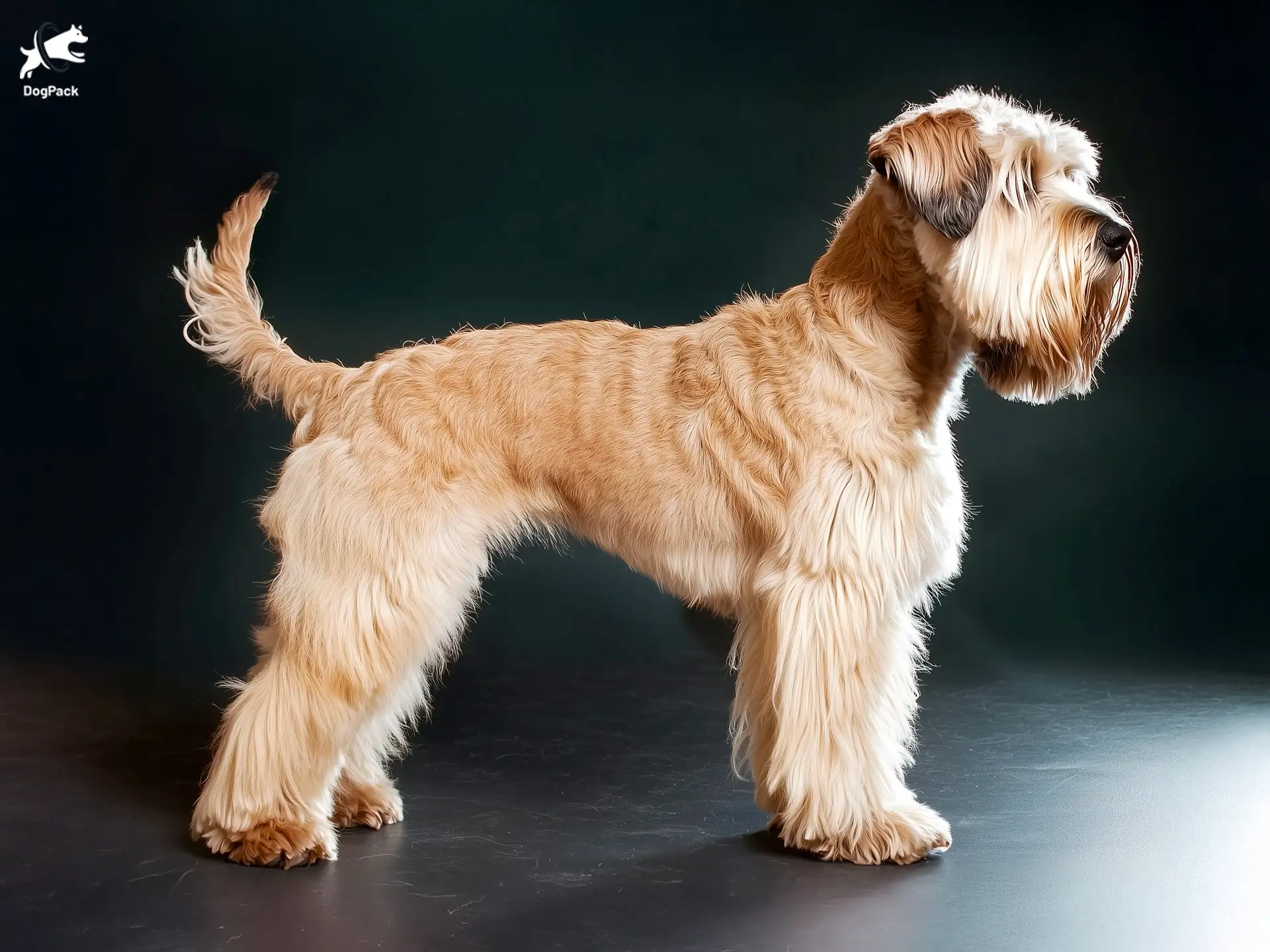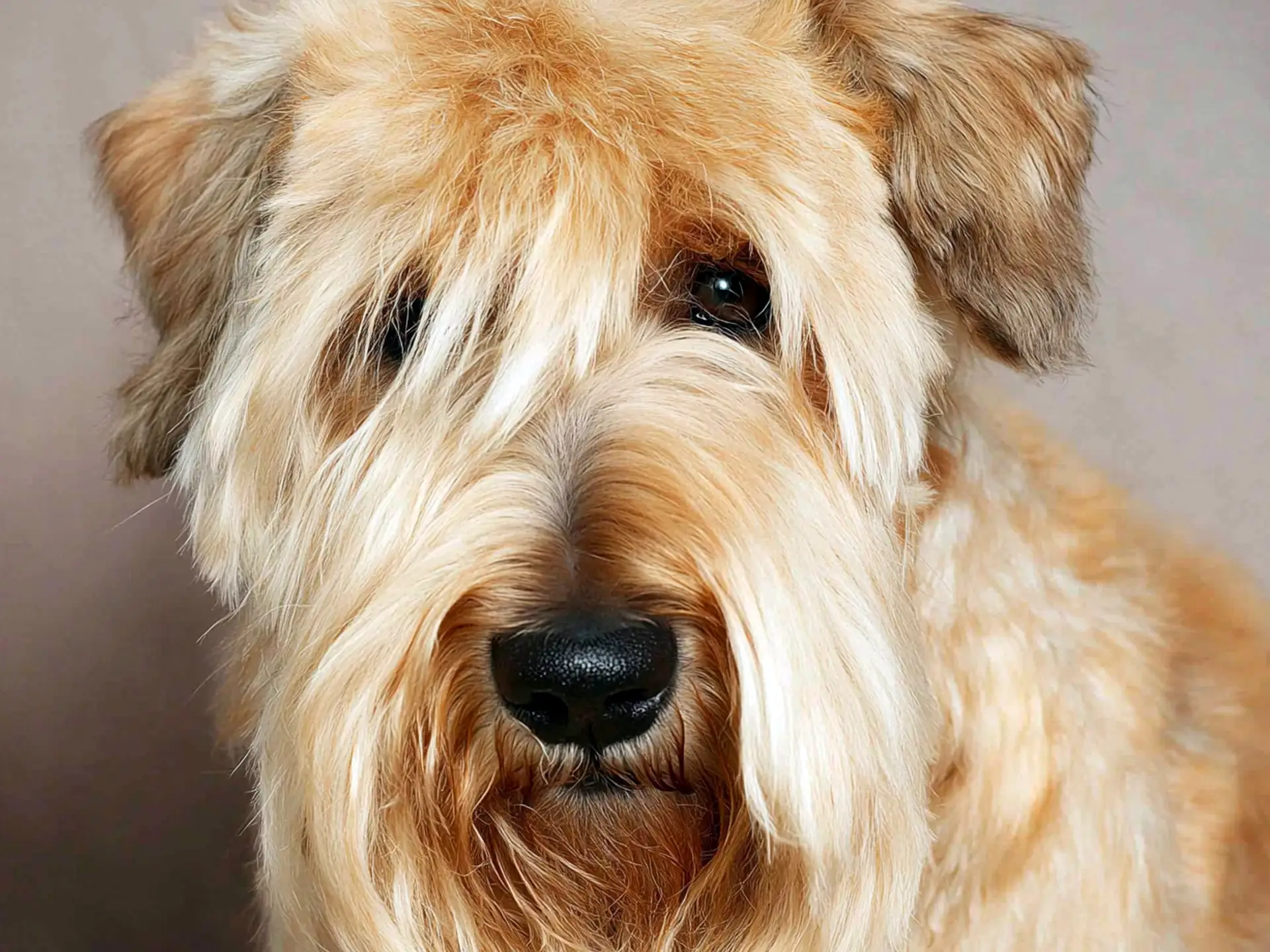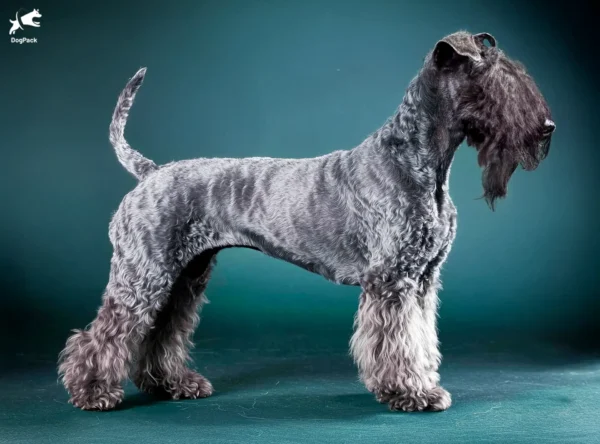Soft Coated Wheaten Terrier Dog Breed Info & Overview
Bouncy, affectionate, and sporting a luxurious wheat-colored coat, the Soft Coated Wheaten Terrier is a medium-sized purebred brimming with Irish charm. This sociable pup delights in human companionship and thrives in homes that provide plenty of activity. Their hypoallergenic coat and friendly nature make them a popular choice among families seeking a devoted, cheerful canine.
Characteristics
Pictures
Breed History
The Soft Coated Wheaten Terrier traces its roots back centuries to the rolling farmlands of Ireland. Originally prized by peasants for its versatility, this terrier excelled at herding, hunting vermin, and guarding homesteads. Though overshadowed by more prominent Irish breeds, the Wheaten built a loyal local following, eventually gaining recognition for its distinctive wheat-colored coat.
For decades, rural farmers saw the Wheaten as a trusty helper rather than a fancy show dog. Legend has it these scruffy companions shared humble cottages, always ready to rouse at dawn for the day’s chores. Their resilience and unwavering spirit made them ideal for tackling tough Irish conditions, from damp weather to rocky terrain.
Official recognition came later, with the Irish Kennel Club registering the breed in 1937, followed by broader global acceptance in the late 20th century. By the time the Soft Coated Wheaten Terrier reached North America, its affectionate temperament and low-shedding coat had already garnered fans among families seeking a purebred dog breed. Today, it remains a proud testament to Ireland’s terrier lineage and rural heritage.
Temperament, Personality
Bubbly and quick-witted, the Wheaten is renowned for greeting loved ones with exuberant “Wheaten greetings”—bounding leaps and tail wags galore. They typically bond strongly with their humans, craving attention and dishing out playful affection. Strangers often find them friendly, though a dash of that classic terrier spunk can appear if they sense any threat to their family.
Beneath the joyous exterior is a bright mind eager for stimulation. These dogs thrive on games, puzzles, and tasks that let them channel their curiosity in positive ways. Without proper outlets, the Wheaten might turn to rambunctious mischief, so consistent engagement is key. Their sensitivity also means gentle, positive reinforcement training fosters better results than harsh methods.
The Soft Coated Wheaten Terrier generally coexists well with children and other pets, provided early socialization sets healthy boundaries. While they rarely show aggression, vigilance is still wise when meeting unfamiliar animals. With their zest for life, these terriers can be a delightful choice for families seeking a balance between spirited companionship and an affectionate lap dog.
Physical Characteristics
Square-proportioned and sturdy, this terrier typically stands between 17 and 19 inches at the shoulder and weighs around 30 to 40 pounds. Despite a muscular build, they maintain a nimble, athletic posture befitting their working-class roots. Their head is moderately long with dark, soulful eyes that often hint at the breed’s trademark cleverness.
Signature to the Wheaten is its abundant coat that flows in soft waves. While puppies may be born with darker or varied colors, the mature adult coat usually settles into a warm wheat hue. Texture matters, too: it’s silky rather than wiry, offering that instantly recognizable fluff that begs for a friendly ruffle behind the ears.
In motion, the Soft Coated Wheaten Terrier exudes grace, with a fluid gait that covers ground efficiently. They’re built for agility—capable of quick turns when chasing a toy or bounding after a squirrel. Though moderately sized, these dogs remain a standout among medium dog breeds, possessing a confident presence that often surprises newcomers with their sprightly nature.
Health Issues
Despite a generally robust constitution, Wheatens can be susceptible to certain inherited conditions. Protein-losing enteropathy (PLE) and protein-losing nephropathy (PLN) are two notable concerns involving the digestive and urinary systems. Regular wellness checks, including blood and urine tests, can help catch these issues early. Hip dysplasia also appears occasionally, so maintaining a healthy weight and moderate exercise is essential.
Responsible breeders often conduct genetic testing to reduce the likelihood of passing on these ailments. Prospective owners are encouraged to request health clearances and discuss potential risks upfront. Periodic eye examinations can also be beneficial, as progressive retinal atrophy sometimes occurs. By staying proactive, families can ensure their Wheaten remains vibrant well into its senior years.
For detailed health guidelines, many owners turn to the Soft Coated Wheaten Terrier Club of America for expert resources. Working closely with a trusted veterinarian ensures timely screenings and tailored advice for your pet’s needs. Ultimately, the Soft Coated Wheaten Terrier benefits most from attentive care, a nutritious diet, and consistent exercise to maintain overall wellness.
Grooming Needs
With a single-layer coat rather than the typical double, Wheatens produce less dander and are often dubbed a dog breedfor allergies. Still, grooming is far from hands-off. Their soft, wavy fur requires regular brushing—ideally several times a week—to prevent tangles and matting. Neglecting upkeep can lead to stubborn knots and an overall unkempt appearance.
A professional groomer familiar with terrier coats can maintain the Wheaten’s signature look, trimming around the face and legs for a neat silhouette. Bathing every four to six weeks is typical, but some owners opt for more frequent washes if their dog is particularly active. Drying thoroughly after a bath is crucial to avoid mildew-like odors in the dense fur.
Beyond coat care, the Soft Coated Wheaten Terrier needs routine nail trims, dental hygiene, and ear checks. Because their ears fold over, debris and moisture can accumulate, so weekly inspections help prevent infections. With consistent grooming habits, owners can keep that flowing coat plush and shiny, ensuring this terrier lives up to its well-coiffed, show-ready reputation.
Exercise Requirements
High-spirited and agile, Wheatens need robust daily exercise to channel their energy constructively. A brisk walk around the block won’t always cut it—they thrive when given space to romp or a challenging activity to tackle. Whether it’s fetch, tug-of-war, or agility courses, they’ll eagerly join in and appreciate an environment that encourages active play.
Because they’re quick learners, mixing mental challenges into their routine can make exercise doubly fulfilling. Try hiding treats around the yard or introducing puzzle toys that test their problem-solving abilities. Incorporating short training sessions during playtime also helps sharpen their focus. Without sufficient outlets, their boredom might manifest as digging, chewing, or excessive barking—signals it’s time for more stimulation.
For those with a fenced yard, the Soft Coated Wheaten Terrier loves a safe space to run full tilt. However, this breed also adapts to apartment living if owners commit to multiple daily walks and vigorous play. Scheduling a few extra-long weekend hikes or dog park outings can further satisfy their adventurous, sociable nature.
Training Tips
Wheatens are intelligent but can exhibit a stubborn streak if they sense inconsistent leadership. Clear, concise commands paired with positive reinforcement work best to keep them engaged. Treats, praise, and playful rewards often outweigh any corrective methods, which may lead to resistance. Early socialization, ideally beginning in puppyhood, helps shape a confident, well-behaved companion.
Consistency is the key. If everyone in the household enforces the same rules and commands, the Wheaten quickly learns boundaries. In contrast, mixed messages can embolden their mischievous side. Short, frequent training sessions tend to yield better results than marathon drills, especially given their energetic nature. Remember: a mentally stimulated Wheaten is more likely to stay out of trouble.
For more formal obedience or advanced skills, enrolling in a specialized class can accelerate progress and reinforce good habits. The Soft Coated Wheaten Terrier benefits from structured learning that caters to its lively disposition while building reliability. Over time, this approach ensures a respectful, cooperative pet, whether greeting guests at home or strolling politely on a neighborhood walk.
Nutrition, Diet
Wheatens thrive on a balanced diet formulated for medium-sized, active dogs. Because they’re prone to protein-losing conditions, veterinarians often recommend moderate-protein recipes sourced from high-quality meats like turkey, chicken, or fish. Avoiding grain-heavy or filler-laden foods can help keep digestive issues at bay. Choose brands with limited ingredients to simplify tracking any sensitivities or allergic reactions.
Portion control is vital given their enthusiastic appetites. Most adult Wheatens do well with 1.5 to 2 cups of kibble split into two meals per day, though needs can vary. If your dog is active, you might increase the daily amount slightly. Monitoring their waistline and rib visibility offers a quick way to gauge if they’re being overfed or underfed.
Because of their sensitivity to certain ingredients, consult your vet before adding supplements or switching brands. A Soft Coated Wheaten Terrier prone to digestive upset may benefit from probiotics or omega-3-rich fish oil, but only under professional guidance. Keeping fresh water available at all times is essential for dogs consuming a concentrated kibble diet high in protein.
Adoption, Breeders
Reputable Wheaten breeders take steps to screen for genetic concerns and prioritize socialization from an early age. Begin your search by checking organizations like the Soft Coated Wheaten Terrier Club of America or contacting the breed’s national club for breeder referrals. Expect to fill out an application, as conscientious breeders want to ensure their puppies find families committed to proper training and care.
For adoption prospects, rescue organizations dedicated to Wheatens are an excellent avenue. Older dogs can be just as loving—sometimes even easier to manage due to prior training. Check out Petfinder or local humane societies to discover if a Soft Coated Wheaten Terrier is in need of a home. Many rescues offer support during the transition, ensuring a smooth adoption experience.
Before welcoming any new canine friend, research typical care costs, potential health screenings, and grooming obligations. Budgeting for training classes, vet bills, and proper nutrition sets you and your Wheaten up for success. Whether you choose a breeder or rescue route, finding a well-matched, healthy dog ensures you’ll enjoy years of happy companionship and tail-wagging greetings.
Family Pet?
Many families appreciate the Wheaten’s outgoing nature and eagerness to join group activities. Known for forming strong bonds with children who treat them kindly, they can be a lovable addition to households that have time for daily play and social engagement. They also handle moderate noise and bustle well, typically adapting to lively family routines.
Though they can be a bit boisterous, this breed’s affectionate nature generally means little risk of aggression. Still, supervision is recommended when small children are involved, to ensure playful energy remains controlled. Teaching youngsters to respect the dog’s boundaries—especially while eating or resting—helps foster a safe, trusting relationship for both two-legged and four-legged family members.
Additionally, the Soft Coated Wheaten Terrier thrives on attention and may become anxious if left alone for extended periods. Work-from-home families or those with flexible schedules typically fare best. Interactive toys and puzzle feeders can help occupy them when humans are busy, ensuring everyone lives harmoniously without shredded cushions or constant pleas for playtime.
Right For You?
Active owners who enjoy a dog that can keep up on hikes or daily jogs may find the Wheaten a perfect match. On the flip side, a low-key household might struggle if they can’t provide enough outlets for this terrier’s enthusiasm. Striking a balance between structured routines and spontaneous fun ensures this spunky companion remains content and well-behaved.
Those seeking a less-shedding option with an outgoing personality often appreciate the Wheaten’s minimal dander. Yet grooming demands and moderate barking habits might pose challenges for some. If a prospective owner envisions a couch potato, they’d be surprised—these dogs love to move and typically do best in an environment that channels their vibrant energy.
For individuals ready to invest in mental stimulation, daily exercise, and regular grooming, the Soft Coated Wheaten Terrier can be a delightful companion. Their infectious cheer brightens any home, but they aren’t for everyone—particularly if you prefer a low-energy breed. Evaluate your lifestyle carefully to decide if their playful spirit aligns with your expectations and schedule.
Conclusion
Bright, bouncy, and undeniably loving, the Soft Coated Wheaten Terrier brings a unique blend of fun and devotion to any home. Their jaunty stride and soft, wheat-hued coat turn heads, but it’s their enduring loyalty that truly stands out. While they need consistent grooming and steady exercise, those willing to invest the time will be rewarded with a cheerful, family-oriented companion.
Whether exploring the neighborhood or cuddled up on the couch, these sociable terriers relish being at the heart of the action. If you’re seeking a versatile, medium-sized breed that’s often gentler on allergies and full of personality, consider opening your home to a Wheaten. You may find they brighten your day in more ways than one.
FAQs
-
Why do Soft Coated Wheaten Terriers greet people by jumping?
The Soft Coated Wheaten Terrier is famous for the “Wheaten Greetin’,” an enthusiastic habit of jumping up on people to say hello. This stems from their affectionate and social nature, and while charming, it may require training to manage properly.
-
Do Soft Coated Wheaten Terriers change color as they grow?
Yes! Wheaten puppies are often born with a darker coat, which gradually lightens to their signature soft, wheaten shade over the first two years. Some retain darker ears or facial shading even into adulthood.
-
Why do Soft Coated Wheaten Terriers love to “pounce” while playing?
Wheatens often use a playful “spring” or pounce while chasing toys or playing with other dogs. This behavior is a remnant of their history as farm dogs used for catching vermin and herding livestock.
-
Are Soft Coated Wheaten Terriers more likely to spin in circles when excited?
Yes! Many Wheaten owners notice their dogs doing excited spins, often just before meals, walks, or greeting their favorite people. This joyful behavior is common in the breed and showcases their energetic and affectionate nature.
-
Do Soft Coated Wheaten Terriers have an unusual texture to their coat?
Unlike many other terriers, Wheatens have a soft, silky, and slightly wavy coat with a texture similar to human hair. This unique feature makes them distinct from wiry-coated terrier breeds and contributes to their hypoallergenic reputation.
Breed Ratings
The Soft Coated Wheaten Terrier learns quickly but shows stubbornness when faced with repetitive training sessions.
This terrier brims with joy and loves games, making every interaction feel like a mini celebration of life.
A Soft Coated Wheaten Terrier thrives on active pursuits but also enjoys downtime with the family.
Though they’re considered low-shedding, regular grooming is essential to keep stray hairs and tangles at bay.
Wheatens can chase small animals, but consistent training and early socialization help curb high hunting instincts.
Their silky coat tangles easily, requiring routine brushing and trims to maintain that signature flowing look.
They’re bright but strong-willed, so short, fun sessions yield better success than prolonged or overly stern methods.
Separation can lead to anxiety and mischief; they do best with owners who offer plenty of interaction.
Wheatens alert bark when excited or suspicious, but excessive vocalizing is manageable with consistent guidance.
These terriers rarely drool, making them a good fit for owners who prefer a tidier household environment.
They typically get along with canine companions if socialized early, though supervision is wise with unfamiliar dogs.
Apart from known genetic issues, regular vet checkups and a mindful diet help them enjoy a long, lively life.



















